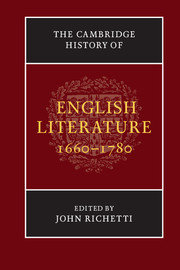Book contents
- Frontmatter
- Introduction
- PART I LITERARY PRODUCTION AND DISSEMINATION: CHANGING AUDIENCES AND EMERGING MEDIA
- PART II LITERARY GENRES: ADAPTATION AND REFORMATION
- PART III LITERATURE AND INTELLECTUAL LIFE: THE PRODUCTION AND TRANSMISSION OF CULTURE
- 14 History and literature 1660–1780
- 15 A preliminary discourse on philosophy and literature
- 16 Britain and European literature and thought
- 17 Religion and literature
- 18 Literary criticism and the rise of national literary history
- 19 Augustan England and British America
- PART IV LITERATURE AND SOCIAL AND INSTITUTIONAL CHANGE
- PART V LITERARY GENRES: TRANSFORMATION AND NEW FORMS OF EXPRESSIVENESS
- PART VI CONCLUSION
- Chronology
- Bibliographies
- Index
- References
16 - Britain and European literature and thought
from PART III - LITERATURE AND INTELLECTUAL LIFE: THE PRODUCTION AND TRANSMISSION OF CULTURE
Published online by Cambridge University Press: 28 March 2008
- Frontmatter
- Introduction
- PART I LITERARY PRODUCTION AND DISSEMINATION: CHANGING AUDIENCES AND EMERGING MEDIA
- PART II LITERARY GENRES: ADAPTATION AND REFORMATION
- PART III LITERATURE AND INTELLECTUAL LIFE: THE PRODUCTION AND TRANSMISSION OF CULTURE
- 14 History and literature 1660–1780
- 15 A preliminary discourse on philosophy and literature
- 16 Britain and European literature and thought
- 17 Religion and literature
- 18 Literary criticism and the rise of national literary history
- 19 Augustan England and British America
- PART IV LITERATURE AND SOCIAL AND INSTITUTIONAL CHANGE
- PART V LITERARY GENRES: TRANSFORMATION AND NEW FORMS OF EXPRESSIVENESS
- PART VI CONCLUSION
- Chronology
- Bibliographies
- Index
- References
Summary
Charles II's restoration to the Stuart monarchy and Louis XIV's almost simultaneous assumption of personal rule following the death in 1661 of Cardinal Mazarin, who had served as chief minister after the death of Louis XIII to his widow, Anne of Austria, mark the beginning of a long period – more than a century – in which cultural relations between Britain and the Continent were dominated by rivalry and interchange with France. French influence in Britain had superseded the predominance of Italy and Spain carrying over from the Renaissance, and as part of the still important relations with the Netherlands the contribution of francophone Huguenots became central. In the late eighteenth century intercourse with Germany gained significance, soon to flourish with Romanticism.
For Britain and France these latter years of the seventeenth century were an extended era in which cultural stability and dynamism were combined, in which ‘good sense’ was a central value, promoted by satire and criticism, which increasingly reflected the new power of an informed public. There is an energy common to the English Restoration and the first half of the reign of Louis XIV, only partially captured by the labels ‘neoclassicism’ and classicisme, which carries over into an Enlightenment that is as important in Britain as in France. The common misnomer ‘Age of Reason’ for the European Enlightenment obscures its anti-rationalist character, which emerges clearly once the British component is given due weight, and that means including not only Locke and Hume, but the Third Earl of Shaftesbury, Mandeville, Addison, Gibbon, Johnson and even Burke, the last two so often mistaken for opponents of the Enlightenment.
- Type
- Chapter
- Information
- The Cambridge History of English Literature, 1660–1780 , pp. 423 - 444Publisher: Cambridge University PressPrint publication year: 2005
References
- 1
- Cited by

